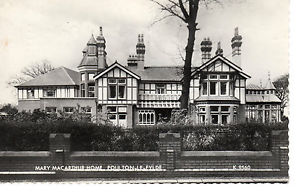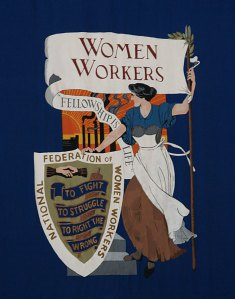National Federation of Women Workers
Read More...

The final holiday home closed in 1991 to continue on Mary Macarthurs original intentions the with investments from the proceeds of the sale.
to fight, to struggle, to right the wrong
History
The Trust was created in 1922 and all those associated with it are proud of its long record of service. In carrying out the objects of the Trust the Management Committee is always conscious that they should act to meet the ideals of the woman whose name the Trust bears Mary Macarthur.
Mary Macarthur was born in Ayr in 1880 the daughter of a draper. Joining the Shop Assistants Union in 1901 she was elected the President of its Scottish District Council within a year. In 1903 she moved to London and became General Secretary of the Women's Trade Union League. She helped to form the National Federation of Women Workers in 1906 and was its President for the first two years. She served as its General Secretary from 1908 to 1921 when it was merged with what is now the GMB, shortly before her tragic early death.
In 1916 with the help of the National Federation and the General Unions, she successfully secured an amendment to the Munitions Act. This required that women should receive the same rate of pay as men when carrying out men's work and led to the establishment of the first national minimum rate in the engineering industry. This was only one of her many triumphs. In 1918 she was an unsuccessful candidate in the parliamentary election for the constituency of Stourbridge. One of the reasons for her failure was that although well known as Mary Macarthur she had to use her married name of Mary Anderson. In 1911 she had married Will Anderson who was himself a Member of Parliament from 1914. When her husband died in the influenza epidemic in 1919 Mary was left to bring up their four year old daughter.
During the First World War she worked tirelessly for the employed and unemployed and, at the invitation of Queen Mary, became Honorary Secretary of the Central Committee of Women's Unemployment. Her life was dedicated to helping the disadvantaged to help themselves. She died at Golders Green on 1 January 1921.
Before her death Mary Macarthur had often expressed concern that the tired working women, with whom she came into contact, had no hope of respite or of a holiday. Her hope was that a holiday home could be opened to which they could go for a period of rest.
After her death a memorial fund was started as the Mary Macarthur Holiday Homes for Working Women and within a few months the first home The Gables was opened at High Ongar in Essex. The Gables and subsequent homes at Stanstead, Littlehampton and Poulton-le-Fylde flourished.
In 1991 the Committee of Management realised that the income of the Trust was insufficient to maintain a holiday centre which matched modern needs and expectations. They therefore decided they should find an alternative way of providing for women in need which they were confident respected Mary Macarthur's original intentions and would have met with her approval. The remaining home at Poulton-le-Fylde was sold and the proceeds of sale invested. The name of the charity was changed to the Mary Macarthur Holiday Trust and since then the income and donations have been used to provide holidays for working and working age women and thus to serve a real area of need.
Since 1991, the new Mary Macarthur Holiday Trust has achieved the provision of a holiday of their choice for There can be no doubt that the unique place that the Mary Macarthur Homes held in the area of social responsibility, and the memory of Mary Macarthur herself, are perpetuated through the Trust Fund Charity
Her aim to fight, to struggle, to right the wrong so that those in need might hope for better things is continued today in the fulfilment of her dream to provide the respite needed by women.
